Experts say Muslim Americans politicized
Experts discussed how the perception of Muslim Americans has become politicized since September 11, 2001, on Thursday at Muslims in America: Identity, Politics and Engagement, a panel sponsored by the Jesse M. Unruh Institute of Politics.

Mosque and state · Najeeba Syeed-Miller (left), an assistant professor at the Claremont School of Theology, Sherman Jackson (center), a USC professor of religion, and Unruh Institute Director Dan Schnur (right) discuss how politics have affected U.S. Muslims. - Ani Kolangian | Daily Trojan
Both Muslim and non-Muslim students and faculty attended the panel, which focused on the high-stakes politics of an election year and the social climate surrounding the 10-year anniversary of the Sept. 11 attacks.
Panelist Sherman Jackson, a professor of religion and American studies and ethnicity King Faisal Chair in Islamic Thought and Culture, said turning the Islamic culture into a political issue is part of the problem.
“This is a culture in which we have politicized everything,” Jackson said.
He said politicians use lingering fear of terrorism and ignorance of the Muslim culture to polarize voters on certain issues.
Moderator Dan Schnur, director of the Unruh Institute, said this tactic is the opposite of what politicians should do.
“For years and years, the primary way the candidates have gotten elected was through the efforts of persuasion of voters on the other side of the aisle,” Schnur said. “Instead, now those candidates on both sides of the aisle turn to people who already agree with them and hype them up into a frenzy.”
Several panelists and audience members said the way they see politicians mobilize their supporters into these frenzied states is through ramping up sentiment for polarizing issues. Panelist Christian Patterson, vice president of the Political Science Undergraduate Association, said the controversy around the plan to build a mosque near the site of the attacks on the World Trade Center is one example of this tactic.
“Whether you agree or disagree with the so-called ‘9/11 mosque,’ the way politicians dealt with it was to use it to motivate people to sprout up with anti-Muslim sentiment and to make it an issue,” Patterson said.
This use of fear for political gain is especially a problem for Muslim Americans, panelists said.
“The problem is that Islam becomes an explanation for everything … no matter what Muslims do, their actions will be attributed back to the Quran,” Jackson said. “Islam and Islam alone comes to be identified as the animator of all Muslim action.”
Though this use of religion as a political scapegoat has been a persistent issue for several years, panelists were hopeful this trend could be reversed.
“We need to have conversations about what are the unique contributions of Muslim Americans, how are we different and what are we bringing to the table,” said panelist Najeeba Syeed-Miller, assistant professor of interreligious education at the Claremont School of Theology.
The event was planned in part to broaden the conversation about the Muslim community in America.
“The primary hope is that people understand that Muslims are one of the most diverse groups in America,” said Director of Muslim Student Life Ali Mir. “They are diverse; they are human beings; they are dynamic and they don’t all practice religion in the same way.”
The reactions of several students in the audience showed that the event realized these goals.
Catherine Brackett, a freshman majoring in political science, said she understood Muslim culture better after hearing the panelists’ discussion.
“I’d never thought about the fact that Islam was brought here by slaves because society always associates it with Arabs and that is not the whole truth,” Brackett said. “It enlightened me in that way.”
Though they were not learning about Muslim culture in the same way, Muslim students in the audience also said the discussion was insightful.
“To be part of a conversation so diverse as this was really great,” said James Khabushani, a junior majoring in business administration. “It brought me a different perspective on what my ethnicity means.”

UPDATE: A 2011 survey has the negative rating down to 61%. I guess we’re making some progress.
It is my hope that one day these panels on religion will also address the god-view of non-believers/unbelievers as a 2007 Pew survey shows while 46% would be less inclined to vote for a Muslim for president, 63% would be less likely to vote for an atheist.
As an atheist myself, it is curious that the lack of a supernatural worldview would somehow make a person a less acceptable candidate, particularly in light of sectarian infighting; historically and in contemporary culture.
Great panel to hold. The Muslim world is so diverse and varied: just like the Christian world. It’s such a shame that most media representations are so concentrated on only one aspect.
Yes, and there are still black slaves today in Africa owned by Muslim Arabs…whaddya know? How diverse!